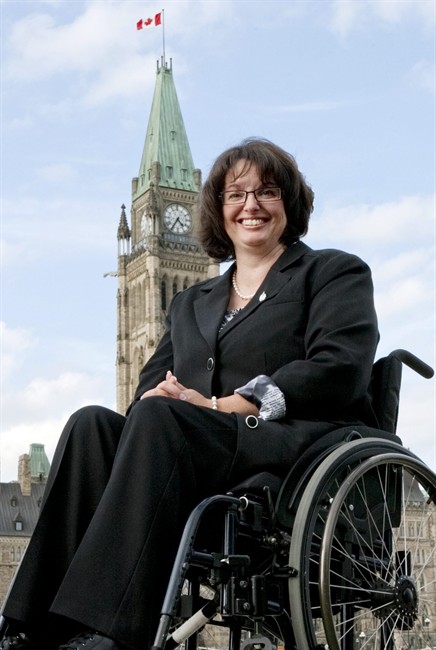MASCOUCHE, Que. – Here’s something Canadians might not know about the floor of the House of Commons: it isn’t as wheelchair friendly as they might think.

Rookie New Democrat Manon Perreault – the second-ever Canadian MP who is permanently wheelchair bound – struggles whenever she tries to roll herself across the thick carpeting.
Perreault usually asks parliamentary pages to give her a push across the fluffy fabric, which she says offers a surprising amount of resistance.
“The more that carpets are comfortable, the softer they are, the harder it is (to move),” Perreault told The Canadian Press in a recent interview at her riding office north of Montreal.
“It’s a bit like snow.”
But Perreault’s not asking for those carpets to be changed. Her goal is to put accessibility issues on the political radar for the millions of Canadians who face them every day.
This spring, Perreault, a paraplegic who has been using a wheelchair since a 1993 horseback-riding injury, followed the trail blazed with the 2004 election of Conservative MP Steven Fletcher, who is a quadriplegic.
In Parliament, Perreault raises her hand to vote instead of standing up. To avoid climbing the steps to the back bench, the newbie already sits in the front row.
That spot is usually reserved for a party’s most-seasoned MPs.
“It’s very good for a rookie,” she said with a laugh.
The significance of her win wasn’t lost on Canadians who live with disabilities.
Only days after the election, Perreault’s inbox was jammed with close to 100 congratulatory emails from people living with reduced mobility, many of whom said they hoped to meet her one day.
Perreault responded to the gestures in her first House of Commons statement – during which she shared her win with all four million Canadians with disabilities.
In those remarks, Perreault also pledged to help them play an active role in society and raise awareness about the needs for social programs to fight isolation.
Only a few months into her new gig, Perreault’s experience in federal politics has already been an atypical journey.
The former small-town councillor campaigned in local coffee shops and restaurants instead of knocking on doors, which she says would have been a major undertaking in a wheelchair.
Perreault, who admits she still has a lot to learn about her new job, also wants to work to ensure Canadians who are injured in accidents all receive equal financial compensation.
She has already pressed the government to fulfil its commitment to implement the United Nations Convention on the Rights of Persons with Disabilities it signed a few years ago.
When asked about the possibility of working with Fletcher, Perreault replied that her door is open.
“I’m open to working with anybody, as long as it’s sincere and we’re truly doing it for people – that we’re not doing it for PR,” said Perreault, a unilingual francophone who’s planning to learn English.
Fletcher, Canada’s minister of state for transport, has worked on projects such as a registered disability savings plan and the creation of a fund to make communities more accessible.
He’s confident he can work with Perreault, despite the political and linguistic hurdles.
“There are a lot more similarities between MPs than differences and Manon Perreault and I have something in common that goes beyond party or language,” said Fletcher, who uses an electric wheelchair to get around.
Fletcher’s initial election victory led to several adjustments on Parliament Hill, such as a rule change to allow his caregiver to enter the House of Commons, additional wheelchair ramps and adaptations to one of the elevators.
Aside from their political and linguistic differences, Fletcher and Perreault have entirely different personal challenges to deal with.
The Manitoba MP, paralyzed from the neck down after a 1996 highway collision with a moose, said her presence on the Hill will help other politicians understand that people with disabilities – including paraplegics and quadriplegics – have different needs.
Fletcher added it became obvious very quickly after he was first elected that federal politicians knew little about people with mobility challenges.
“Just allowing people to see what is in fact possible, or what is needed, has had an impact on the mentality of decision-makers and people who influence public opinion,” he said.
But he noted that there could be one thing that might affect a working relationship between him and Perreault.
“Perhaps the only exception will be if you catch her and I racing down the halls,” Fletcher said.
“I hope to win that race, but I don’t know, she looks like she could be pretty fast.”



Comments